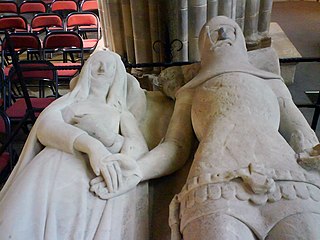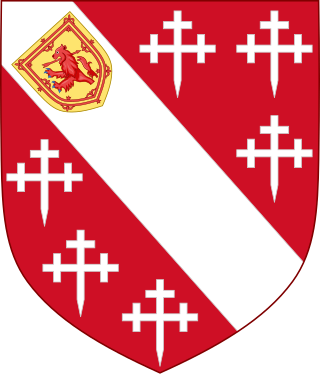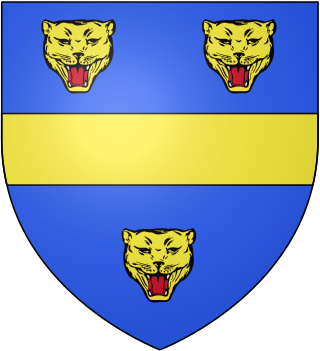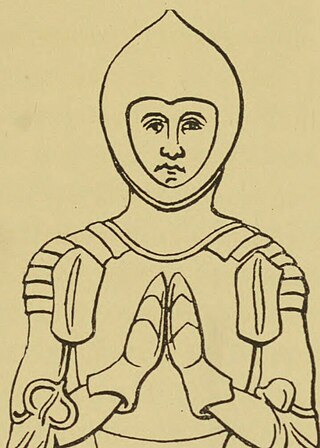
The lords of Wallingford Castle controlled the medieval castle of Wallingford during the medieval and early-modern period.

The lords of Wallingford Castle controlled the medieval castle of Wallingford during the medieval and early-modern period.

Francis Lovell, 9th Baron Lovell, 6th Baron Holand, later 1st Viscount Lovell, KG was an English nobleman who was an ally of King Richard III during the War of the Roses. Sir William Catesby, Sir Richard Ratcliffe and he were among Richard's closest supporters, famously called "the Cat, the Rat and Lovell our dog" in an anti-Ricardian squib. In addition to being an ally, Lovell is described as Richard's best friend.

Richard Fitzalan, 3rd Earl of Arundel, 8th Earl of Surrey was an English nobleman and medieval military leader and distinguished admiral. Arundel was one of the wealthiest nobles, and most loyal noble retainer of the chivalric code that governed the reign of Edward III of England.

The Howard family is an English noble family founded by John Howard, who was created Duke of Norfolk by King Richard III of England in 1483. However, John was also the eldest grandson of the 1st Duke of the first creation. The Howards have been part of the peerage since the 15th century and remain both the Premier Dukes and Earls of the Realm in the Peerage of England, acting as Earl Marshal of England. After the English Reformation, many Howards remained steadfast in their Catholic faith as the most high-profile recusant family; two members, Philip Howard, 13th Earl of Arundel, and William Howard, 1st Viscount Stafford, are regarded as martyrs: a saint and a blessed respectively.

The Lord Warden of the Cinque Ports is a ceremonial official in the United Kingdom. The post dates from at least the 12th century, when the title was Keeper of the Coast, but may be older. The Lord Warden was originally in charge of the Cinque Ports, a group of five port towns on the southeast coast of England that was formed to collectively supply ships for The Crown in the absence at the time of a formal navy. Today the role is a sinecure and an honorary title, and fourteen towns belong to the Cinque Ports confederation. The title is one of the higher honours bestowed by the Sovereign; it has often been held by members of the Royal Family or prime ministers, especially those who have been influential in defending Britain at times of war.
In English law, the justices in eyre were the highest magistrates, and presided over the court of justice-seat, a triennial court held to punish offenders against the forest law and enquire into the state of the forest and its officers.

Catherine Carey, after her marriage Catherine Knollys and later known as both Lady Knollys and Dame Catherine Knollys,, was chief Lady of the Bedchamber to Queen Elizabeth I, who was her first cousin.

John de la Pole, 2nd Duke of Suffolk, KG, was a major magnate in 15th-century England. He was the son of William de la Pole, 1st Duke of Suffolk, and Alice Chaucer, the daughter of Thomas Chaucer. His youth was blighted, in 1450, by the political fall and subsequent murder of his father, who had been a favourite of king Henry VI but was increasingly distrusted by the rest of the nobility. Although the first duke of Suffolk had made himself rich through trade and – particularly – royal grants, this source of income dried up on his death, so John de la Pole was among the poorest of English dukes on his accession to the title in 1463. This was a circumstance which John felt acutely; on more than one occasion, he refused to come to London due to his impoverishment being such that he could not afford the costs of maintaining a retinue.

Michael de la Pole, 1st Earl of Suffolk, 1st Baron de la Pole, of Wingfield Castle in Suffolk, was an English financier and Lord Chancellor of England. His contemporary Froissart portrays de la Pole as a devious and ineffectual counsellor who dissuaded King Richard II from pursuing a certain victory against French and Scottish forces in Cumberland and fomented undue suspicion of that king's uncle John of Gaunt, 1st Duke of Lancaster.

Thomas Chaucer was an English courtier and politician. The son of the poet Geoffrey Chaucer and his wife Philippa Roet, Thomas was linked socially and by family to senior members of the English nobility, though he was himself a commoner. Elected fifteen times to the Parliament of England, he was Speaker of the House of Commons for five parliaments in the early 15th century.
The Chief Butler of England is an office of Grand Sergeanty associated with the feudal Manor of Kenninghall in Norfolk. The office requires service to be provided to the Monarch at the Coronation, in this case the service of Pincera Regis, or Chief Butler at the Coronation banquet.

William Knollys, 1st Earl of Banbury, KG, PC was an English nobleman at the court of Queen Elizabeth I and King James I.
The Justice of Chester was the chief judicial authority for the county palatine of Chester, from the establishment of the county until the abolition of the Great Sessions in Wales and the palatine judicature in 1830.
This is a list of Sheriffs of Norfolk and Suffolk. The Sheriff is the oldest secular office under the Crown and is appointed annually by the Crown. He was originally the principal law enforcement officer in the county and presided at the Assizes and other important county meetings. After 1576 there was a separate Sheriff of Norfolk and Sheriff of Suffolk.
Events from the 1390s in England.

Alice Chaucer, Duchess of Suffolk, LG was a granddaughter of the English poet Geoffrey Chaucer. Married three times, she eventually became a Lady of the Most Noble Order of the Garter, an honour granted rarely to women and marking the friendship between herself and her third husband, William de la Pole, 1st Duke of Suffolk, with King Henry VI and his wife Margaret of Anjou.

The Honour of Wallingford was a medieval English feudal barony which existed between 1066 and 1540 with its caput at Wallingford Castle in present-day Oxfordshire.
Lady Alice Fiennes was the eldest daughter and co-heiress of Henry FitzHugh, 5th Baron FitzHugh, and Alice Neville. Alice was born at the ancestral castle of Ravensworth. She married Sir John Fiennes, the son of Sir Richard Fiennes and Joan Dacre, 7th Baroness Dacre. Alice was a first cousin of Queen consort Anne Neville and a great-aunt of Queen consort Catherine Parr.

Sir Thomas Brandon, of Southwark, Surrey, and of Duddington, Northamptonshire, KG was an English soldier, courtier and diplomat.
Sir William FitzWilliam, of Windsor, Berkshire, was an Irish courtier and Member of Parliament in England. He was Chief Gentleman of the Privy Chamber to Edward VI of England; Deputy Chancellor of Ireland; Lieutenant of Windsor Castle; Keeper of Windsor Great Park and Lord Lieutenant of Berkshire.